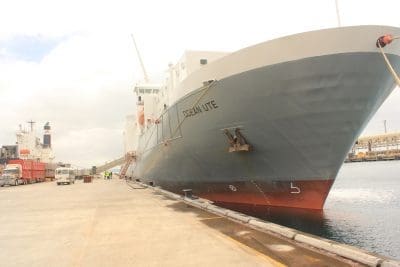
Wellards’ The Ocean Ute at Portland.
Wellard posted a net loss after tax for the 2023 financial year of A$24 million ($US15.5m), that compared to the previous financial year result of a net profit of A$15.3m (US$9.9m).
Wellard attributed its disappointing financial performance in FY2023 to numerous factors.
The most significant was a poor macro-trading environment – headlined by continued depressed live cattle exports from Australia which resulted in low charter rates and low vessel utilisation – and a A$5.2m (US$3.4m) engine repair cost to the M/V Ocean Swagman, which was also off-hire for 87.5 days.
Wellard has since submitted both Hull & Machinery and Loss of Hire claims to its insurer, however the costs were incurred in FY2023 and any payment of claims will be received in FY2024.
In a statement to the ASX, Wellard said that despite the FY2023 loss, trading conditions are improving and provide a positive outlook for the 2024 financial year currently underway.
The company also reported that its balance sheet remains in a strong position with A$11.5m (US$7.4m) in cash and cash equivalents contributing to negative net debt of A$7.5m (US$4.8m) as of 30 June 2023.
“This balance sheet strength combined with a lean cost structure should allow the company to weather the impact of poor trading conditions globally and to capitalise on an improving trading environment,” the statement said.
 Wellard executive chairman John Klepec said Wellard commences FY2024 with a more promising charter book and growth outlook than in either FY2022 or FY2023, principally due to the pick-up in activity in the South America to Turkiye cattle trade and falling fuel prices.
Wellard executive chairman John Klepec said Wellard commences FY2024 with a more promising charter book and growth outlook than in either FY2022 or FY2023, principally due to the pick-up in activity in the South America to Turkiye cattle trade and falling fuel prices.
“However, we are waiting for further demand to crystalise into Q2 to add greater certainty to our forward order book of charters.”
Other factors impacting Wellard’s financial result in FY2023 included a non-cash depreciation and amortisation expense of A$16,4m (US$10.6m), global inflation driving up fuel prices and operating expenses which increased by A$2.8m (US$1.8m) year-on-year basis, and relocation costs for the M/V Ocean Drover and M/V Ocean Swagman to South America to access the reopened market to Turkiye.
Disappointing performance out of Australia was exacerbated by the continuing trend of smaller consignments demanded by Indonesia importers.
Illustrative of this trend was that 10 voyages departed the Port of Darwin in June 2023, with an average consignment size of just 1,488 head.
“That average sized consignment would take up less than one deck on Wellard’s M/V Ocean Drover with another eight decks to spare. Or, alternatively, all the cattle on those 10 voyages would have fitted on a single M/V Ocean Drover voyage, with room to spare,” Mr Klepec said.
Overall, Wellard loaded a total of 142,086 cattle in FY2023, with a 99.95% delivery success rate, similar to FY2022 figures.
A fully booked outlook
Wellard says its vessels are expected to be fully booked for Q1 FY2024.
Recent falling Australian cattle prices have sparked some trading activity from Australia to Vietnam, but they have so far failed to stimulate additional demand from Indonesian importers, who continue to compete with frozen Indian Buffalo Meat and Brazilian beef products in that market.
“This will likely require Australian producers to release more cattle at current or lower prices to stimulate trading activity with Indonesian cattle importers,” Mr Klepec said.
In Indonesia, detection of Lumpy Skin Disease in cattle delivered from Australia, and the resultant interim restrictions imposed by Indonesia are adding to that uncertainty.
“The trade of breeder cattle to North Asia effectively ground to a halt towards the end of FY2023, but some credible inquiry, usually a precursor to charter demand, has started to resume. We do not expect volumes to return until 2024.”
Live sheep phaseout challenged
The Wellard statement also noted that the company continues to seek to improve global livestock shipping standards and has lodged a submission to the Australian Federal Government’s independent panel consulting on the phase out of live sheep.
The submission argued that the phase out of the live sheep export trade is misconceived, and that when it is properly administered by responsible licensed exporters, the industry can be managed extremely safely and with high animal welfare outcomes.
“If the Australian trade is going to be phased out, Wellard is of the view that the industry must be given sufficient time to plan and implement an orderly transition, and 10-15 year phase out.”
“In its submission, Wellard also noted that the Government must take full legal responsibility for the direct and indirect consequences of the ban, which Wellard believes has been made out of political expediency, and is not based on sound economic analysis, or a thorough examination of the science around obtainable animal welfare outcomes.”

HAVE YOUR SAY